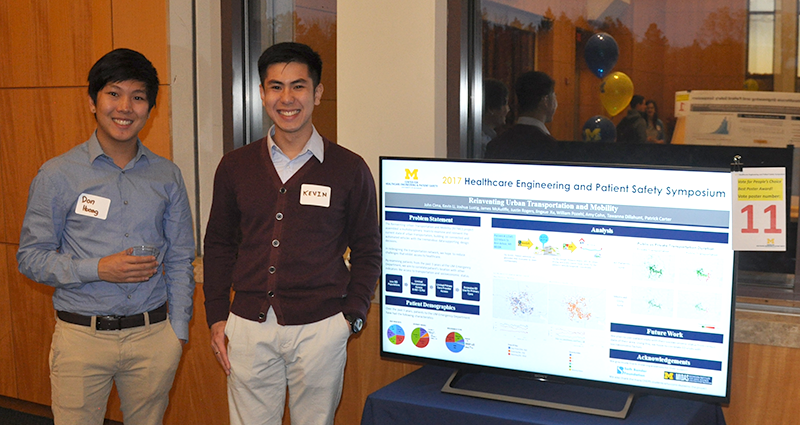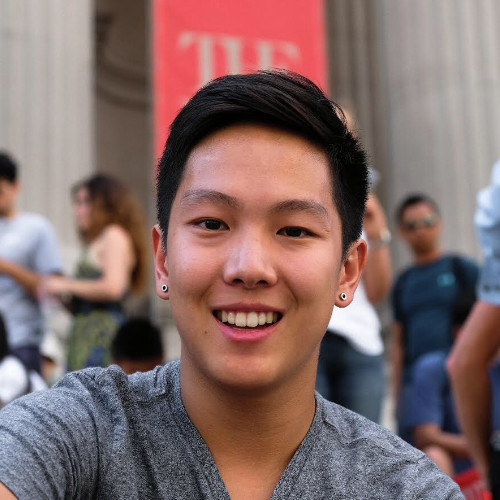
News
Welcome to Tauber Institute for Global Operations News.
Explore our press releases, feature articles, and announcements about Tauber students, speakers, team projects, and events.

Welcome to Tauber Institute for Global Operations News.
Explore our press releases, feature articles, and announcements about Tauber students, speakers, team projects, and events.

It felt like every hour we had a new fire since COVID brought out many of the underlying problems within healthcare - specifically in operations - that have previously been brushed under the rug.
Tauber alumnus Daniel Huang (EGL BSE/MSE-IOE '19) had been working in New York City for less than a year when COVID hit. As a Healthcare Analyst for Huron Consulting Group, Daniel became part of the intense effort to establish NYC testing centers needed to fight the pandemic.
When studying at the University of Michigan, Daniel gained first-hand experience with healthcare operations through his 2018 Tauber team project for Mayo Clinic, where he and his teammates Sho Kawabe (MBA) and Giuliana Sanchez (MBA) addressed issues of instrument standardization for cardiac surgery, minimizing cost while maintaining quality and meeting Mayo Clinic surgical teams' requirements.
Daniel also joined the U-M Center for Health Engineering and Patient Safety (CHEPS), led by his team project's Engineering faculty advisor, IOE Professor Amy Cohn. Addressing operations issues in healthcare is central to CHEPS' mission. Business + engineering undergraduate student Prachi Fozdar recently interviewed Daniel about his experiences for CHEPS Pulse news:
by Prachi Fozdar
(courtesy Center for Healthcare Engineering and Patient Safety)
I recently interviewed Daniel Huang, a University of Michigan Industrial and Operations Engineering (IOE) graduate and Center for Healthcare Engineering and Patient Safety (CHEPS) alum now working as a Healthcare Associate at Huron Consulting Group in New York City.
Daniel's always been passionate about healthcare not only because of his interest in improving healthcare operations but also because he is half deaf. He is unable to hear out of one ear and dreamed of helping others similar to him and fixing the problems he noticed and faced in healthcare along the way.
Throughout his time at the University of Michigan, Daniel studied IOE, where he came to realize that the distribution and organization of healthcare are outdated in many ways. Looking for an organization to become involved in, Daniel learned about CHEPS from a friend, reached out to Professor Cohn, and ultimately joined CHEPS.
During his time at CHEPS, Daniel was involved in a project working to develop a methodology to more deeply understand the relationship between scheduling policies, patient cancellation behaviors, and capacity utilization. A large part of his job at the time was working on the SQL database. Daniel said they “ultimately found that if a patient schedules 6 months out more than likely they’re going to cancel 2 weeks in advance of the appointment and it becomes more difficult for the provider to fill that space and becomes unused time.” When it comes to the entire research and development process of CHEPS projects, Daniel confirmed that he felt “like the entire process was extremely valuable” to both his future school work and post-graduate job. Daniel particularly appreciated “the whole team-based approach to solving a problem and just using data analysis to figure out what is going on and diving deeper into a problem.” As it applies to his career now, he said, “I’m very much the analytical person on my team, and I’m very much someone my team relies on when it comes to making sense of data.”

After leaving the University of Michigan and CHEPS, Daniel moved to New York City and began work for Huron Consulting Group, a boutique consulting firm that specializes in healthcare and higher education. Huron Consulting does a great deal to help hospitals looking to improve operations in order to increase provider and patient satisfaction. Because his job is to essentially work to solve any problem that a hospital may have, Daniel is able to exercise his expertise in supply chain operations. Before the pandemic, Daniel consulted for one of the largest cancer centers in the US, analyzing and maximizing their non-labor cost reduction opportunities.
Less than a year after Daniel graduated from The University of Michigan, COVID began and ravaged New York City, leaving Daniel and his team in high demand. Daniel described, “we initially helped a lot with how to best set up testing centers, so one of our clients was the largest public healthcare provider in the city of New York. Twenty of us went in and figured out where we were going to set up testing centers, how we were going to get supplies there, where we were going to source it, and it was a huge collaboration between that healthcare provider, the mayor’s office, the department of health, and the office of emergency operations. We ended up setting up more than 40 different testing sites across New York City.”

I’m very much the analytical person on my team, and I’m very much someone my team relies on when it comes to making sense of data.
These sites set up by Daniel and his team tested around 1 million people and even attracted the attention and use of people such as US House Representative for New York Alexandria Ocasio-Cortez, highlighting the massive scale and impact of Daniel’s team throughout the pandemic. Similarly, when it came time to administer vaccines, the team faced many problems regarding the fact that the vaccine had to be kept at a sub-zero temperature. This led to challenges in transportation to vaccination sites along with vaccine administration. Ultimately, Daniel and his team were able to convert the New York Mets Baseball field into a vaccination center that operated 24/7.
While the impact that the work Daniel’s team did was profound, trying to accomplish so much was stressful for healthcare operations workers in a similar yet still different way than healthcare professionals. Daniel said, “it felt like every hour we had a new fire since COVID brought out many of the underlying problems within healthcare specifically in operations that have previously been brushed under the rug.” Two of the major reasons for many key aspects of healthcare operations getting overlooked, according to Daniel, are the fast-paced nature of healthcare and the juggling of so many competing priorities. Even though Daniel describes the entire work process as very hectic and even quite scary at times, he appreciated seeing the work he did directly impact the community around him in real-time. However now as the pandemic settles and hospitals become more accustomed to treating COVID, Daniel believes an important future endeavor of healthcare administrators will be to figure out where we go from here in healthcare and how will healthcare providers establish new and improved plans for their operations post-COVID.